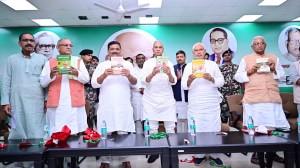Economic changes in China will definitely lead to democracy’
How, when and why did you get out of China?I left China soon after the Tiannanmen massacres. I was invited to visit the UK in April 1989. ...

How, when and why did you get out of China?
I left China soon after the Tiannanmen massacres. I was invited to visit the UK in April 1989. So I had a passport and a visa. I didn’t want to leave China, but after Tiannanmen, I had no option.
What was it like in the days of the massacre?
I was in Beijing at that time. It was terrifying. Tiannanmen Square was full of slogans. And there were many meetings in other parts of the country. Then the troops cracked down on us.
What was the protest about?
WELL, it started as a student protest against corruption, but that was probably just an excuse since the Chinese were very unhappy with the situation. Also, people were angry with the attitude of Chinese leaders towards public opinion about reforms in China. It was the first time in China that people stood up for their dignity. In the beginning, the press was allowed to function, but after a May 26 editorial in the People’s Daily that said “Suppress the unrest”, there was a total blackout in the media.
I could never imagine they would use guns and tanks against their own people. Since most of us were students and not politicians, we could not imagine this reaction. That’s why the dissidents had to leave China.
Is there a network of Chinese dissidents abroad?
YES, but I’m not part of it. I wish we could flourish. I am not a political dissident, but an aesthetic dissident like Gao Xingjiang. I stand on the side of the justice. Political dissidents can be very pragmatic, but as an aesthetic dissident, I can choose my independent area of work without worrying about pragmatic things.
It must have been great to hear about Gao Xingjiang, a dissident like you, winning the Nobel Prize for literature.
YES, as soon as I heard about it, I sent him a mail. This will help in the evolution of Chinese society. People will be ready to receive messages from artists or poets. It’s a great moment for the aesthetic dissidents of China.
Not much is known about Xingjiang’s works. What kind of a writer is he?
GAO Xingjiang is one of the finest, perhaps the best, writer in the Chinese language. I was not surprised when I heard the news. When he was in China, he would work for the Ministry of Culture and he has travelled to France several times. He is influenced by the school of absurdity, people like Samuel Beckett. But he’s also deeply rooted in Chinese tradition.
How did he react to the massacre and suppression of your movement?
SHORTLY after the Tiannanmen Square massacre, he wrote a wonderful play called Escape. It’s the story of a young girl, a young man and a middle-aged man who are in hiding from troops. The story unfolds through their conversation. It’s a story of people trying to escape their condition. After the crackdown, Gao Xingjiang declared that “I would never go back to China again”. Political dissidents cannot take such a decision as they can strike a deal with the government, but Gao Xingjiang will never do such a thing.
How will the Chinese react to his Nobel prize?
IT’S very embarrasing for Beijing. Whenever we meet Chinese officials abroad, they ask, “Do you carry a Chinsese passport or not?” After the Tiannanmen square massacre, many artists, poets and writers left China and gave up their citizenship.
You have been visiting Tibetan settlements in India. Do the Chinese know much about Tibet? What do they think about Tibet and their struggle for freedom?
NO, they don’t know much. There are very few reports in the media which give a true picture of what’s happening in Tibet. But the Chinese are very nationalistic and consider Tibet as part of China. I don’t blame them because they don’t have any other source of information other than the official media.
What could be the solution to Tibet?
IN the 21st century, every nation should have a right to self-determination. But I had a meeting with His Holiness the Dalai Lama, and he told me that he was seeking genuine autonomy and not independence. He also said independence would create more confusion and trouble. I do believe democracy in China will be good for Tibetan people.
The Dalai Lama has been trying to talk with the Chinese for the past 40 years. Is the Chinese response correct?
NOT at all. I am not speaking on behalf of the Chinese government but if the regime is stable and confident of itself, then it will take an initiative to solve the Tibetan problem. And if there is more international pressure on China, maybe they can start talks.
Don’t you feel like going back to China?
YES, if they allow me to. My mother’s there, she’s 67. My father was arrested during the Cultural Revolution when I was five, and executed when I was seven. My mother is my only link with China. I want to go back and be by her side, but it’s difficult, and dangerous.
Do you remember the Cultural Revolution, during which your father was executed?
IT was terrifying. I was so young when my father was killed that I could not understand it. But now when I look back, it’s very difficult for me to get over the trauma of losing my father that way.
China is undergoing tremendous economic changes. Will this lead to democracy?
I AM sure it will. And I am sure because China is set to join the WTO. If it does so, that will end several barriers to currency, free flow of goods, trading and information. Recently we saw what happened in Yugoslavia — a revolution without shedding blood. Similar things may happen in China as well.



- 01
- 02
- 03
- 04
- 05



























